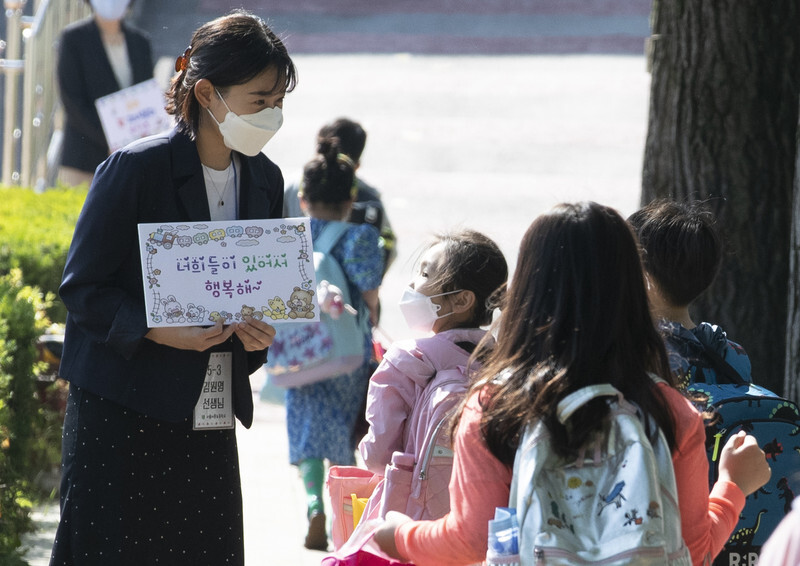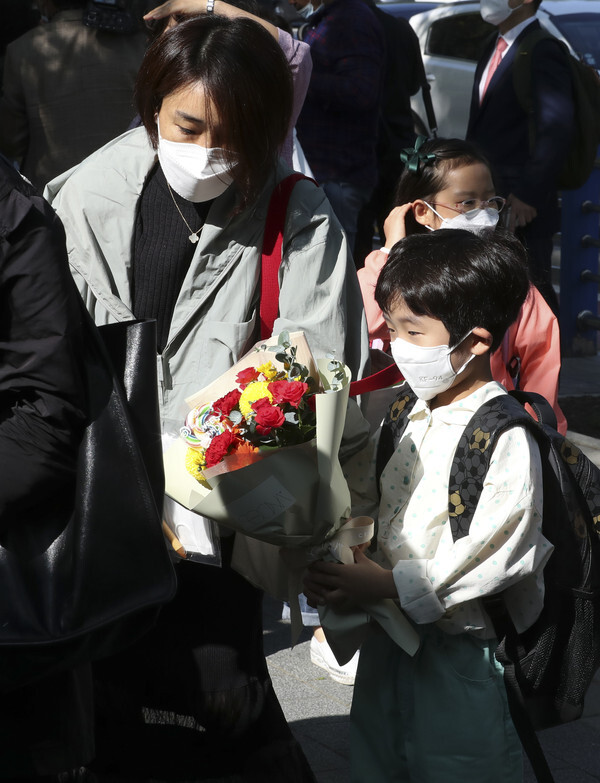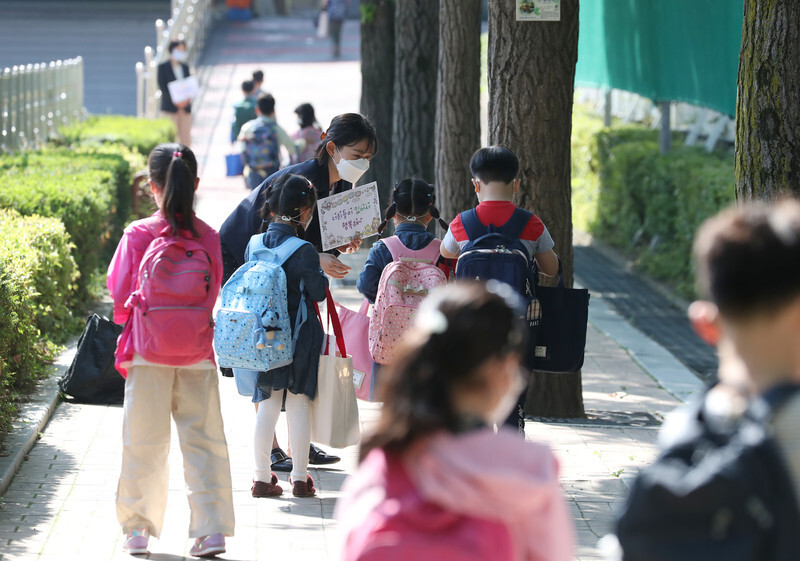hankyoreh
Links to other country sites 다른 나라 사이트 링크
[Reportage] Parents struggle with decision of whether or not to send kids to school

On the morning of May 27, children were bustling in front of Seryun Elementary School in Seoul’s Songpa District, an unfamiliar sight over the last few months, with schools staying shut because of the COVID-19 pandemic. One-third of the 680 or so students at the school showed up on Wednesday, as the first and second grades returned to the classroom in the first phase of elementary school reopening.
Teachers welcoming students back to school were waiting at the gate to check their temperature and distribute hand sanitizer, as a long line of students waited for their turn to enter the school grounds. Parents who’d accompanied their children to school waited alongside them, holding their hands. Some students were carrying flowers that their mothers had bought to congratulate their return to school.
Teachers warmly exchanged greetings both with students and parents. One teacher carried a sign that said, “Happy to have you here.” Footprint stickers had been placed on the ground as a guideline for social distancing, but as more and more students arrived, the line stretched far beyond the footprints.
Excitement was evident among first graders, who were attending elementary school for the first time. Some students could be seen carrying bags that were even bigger than their backpacks. The bags were stuffed not only with textbooks but also projects they’d made as part of distance education in the first part of the semester, as well as tissues and other daily items. “My kid is so excited about going to school and showing everything to the teacher,” the mother of one first grader said.

Many parents used the time waiting in line to remind their kids to pay attention to their teachers. At normal times, parents would have accompanied their children into the school. But since that’s not an option during the coronavirus crisis, they had to stay at the gate as they waved and said goodbye.
Parents generally expressed a mixture of excitement and concern about students finally returning to the classroom. While they’re worried about sending their children to school amid the continuing spread of the coronavirus, they recognize that they have little choice, under the circumstances.
“My daughter and son-in-law both work, and it’s actually been quite a challenge to make sure my granddaughter is taking her classes remotely from home. In fact, the whole family wasn’t sure whether or not we should send her [to school] until this very morning, but we’ve decided to do so, at least for now, because we don’t really have another option,” said Lee In-yong (pseudonym), who brought his granddaughter, in the second grade, to school.
“My grandson is in the fourth grade. I guess we’ll have to decide whether to keep sending the kids to school after seeing how things go today,” Lee added.

A mother surnamed Choi has a child in the second grade. “Given our concerns about sending our child to school, we’d been thinking about switching to home schooling for the time being and signing up for some extracurricular activities,” Choi said. For the duration of the coronavirus crisis, education officials have agreed to allow parents to sign children up for extracurricular activities even if they don’t go to school as long as they’re studying at home. The city of Seoul in particular is allowing children in this position to take part in up to 34 days of such activities.
“We changed our mind after we learned that the teachers are putting so much effort into disease control to ensure that students can be safe at school. For now, we trust the school,” Choi added.
This school reportedly held two surveys to consult with parents about the most suitable way of holding in-person classes. Parents offered a range of opinions, from holding classes every day to holding classes once a week, but the school ultimately went with the most favored option: two days of class a week. Under this plan, students in the first, third and fifth grades and students in the second, fourth, and sixth grades will attend school on alternating days, with each group present two days a week.
Since parents didn’t want students all showing up in one big crowd at the beginning of the school day, each grade’s arrival time will be staggered by 10 minutes. Transparent dividers made of non-harmful materials will be set up in the classrooms, and each grade will be guided through the hallways along separate routes.
Lee Ran, in her mid-30s, has a kid in elementary school and is a member of the school’s steering committee. “I wouldn’t have sent my children to school if I didn’t believe the school had taken [appropriate] measures. The school sent parents photographs to show what preparations were in place. I figured that [those preparations] were OK and decided to send my kid to school,” she said.
“Wearing masks and washing hands have already become part of our lifestyle. Younger kids are better at following [the disease control guidelines] than older kids,” Lee said when asked whether children would be able to put up with the inconvenience of wearing masks all day long.
But Lee added that students may end up not going to school anyway, depending on how the coronavirus crisis evolves. Currently, no community-based infections have been reported in Songpa District. But if the disease spreads there as it has in Gangseo District, schools could close and parents might keep their kids home.
“I think that home schooling is our ‘ace up the sleeve’ for that contingency. We’ll have to play that card if things get worse,” Lee said.
About 2.37 million students around the country returned to school on Wednesday, representing the first and second grades of elementary school, the third year of middle school, the second year of high school, and kindergarten. Students in the third and fourth grades of elementary school, the second year of middle school, and the first year of high school will return to school next week, on June 3, while the remaining students — those in the fifth and sixth grades of elementary school and the first year of middle school — will return on June 8.
Schools in some parts of Seoul; Gumi, North Gyeongsang Province; and Bucheon, Gyeonggi Province have suspended on-campus classes and moved to online classes either individually or collectively because of concerns that have been raised about community-based transmission there. In the weeks to come, the on-campus class schedule will be adjusted at the school or regional level depending on the occurrence of coronavirus cases.
By Choi Won-hyung, staff reporter
Please direct comments or questions to [english@hani.co.kr]

Editorial・opinion
![[Editorial] Yoon must halt procurement of SM-3 interceptor missiles [Editorial] Yoon must halt procurement of SM-3 interceptor missiles](https://flexible.img.hani.co.kr/flexible/normal/500/300/imgdb/child/2024/0501/17145495551605_1717145495195344.jpg) [Editorial] Yoon must halt procurement of SM-3 interceptor missiles
[Editorial] Yoon must halt procurement of SM-3 interceptor missiles![[Guest essay] Maybe Korea’s rapid population decline is an opportunity, not a crisis [Guest essay] Maybe Korea’s rapid population decline is an opportunity, not a crisis](https://flexible.img.hani.co.kr/flexible/normal/500/300/imgdb/original/2024/0430/9417144634983596.jpg) [Guest essay] Maybe Korea’s rapid population decline is an opportunity, not a crisis
[Guest essay] Maybe Korea’s rapid population decline is an opportunity, not a crisis- [Column] Can Yoon steer diplomacy with Russia, China back on track?
- [Column] Season 2 of special prosecutor probe may be coming to Korea soon
- [Column] Park Geun-hye déjà vu in Yoon Suk-yeol
- [Editorial] New weight of N. Korea’s nuclear threats makes dialogue all the more urgent
- [Guest essay] The real reason Korea’s new right wants to dub Rhee a founding father
- [Column] ‘Choson’: Is it time we start referring to N. Korea in its own terms?
- [Editorial] Japan’s rewriting of history with Korea has gone too far
- [Column] The president’s questionable capacity for dialogue
Most viewed articles
- 1Months and months of overdue wages are pushing migrant workers in Korea into debt
- 2Trump asks why US would defend Korea, hints at hiking Seoul’s defense cost burden
- 3[Editorial] Yoon must halt procurement of SM-3 interceptor missiles
- 4At heart of West’s handwringing over Chinese ‘overcapacity,’ a battle to lead key future industries
- 5[Guest essay] Maybe Korea’s rapid population decline is an opportunity, not a crisis
- 6Fruitless Yoon-Lee summit inflames partisan tensions in Korea
- 7First meeting between Yoon, Lee in 2 years ends without compromise or agreement
- 8Dermatology, plastic surgery drove record medical tourism to Korea in 2023
- 9Under conservative chief, Korea’s TRC brands teenage wartime massacre victims as traitors
- 10Anti-immigration candidate marauds across Korea with squad detaining foreigners